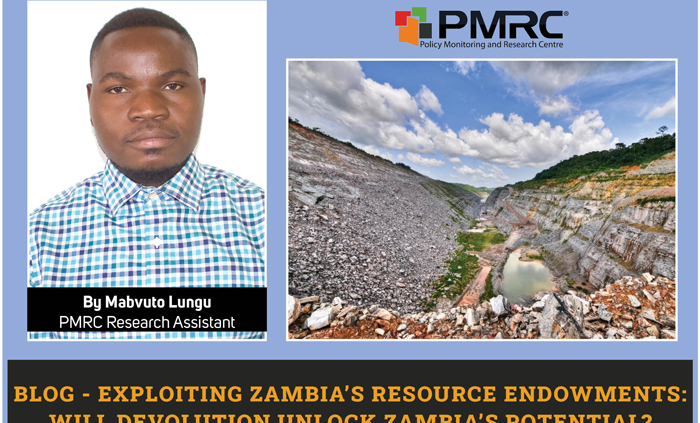Zambia is one of the few countries with access to abundant resources such as water bodies, land, human capital and minerals. These resources have the potential to improve infrastructure and propel growth in the country’s key economic sectors, such as agriculture, mining and tourism. A country’s resource endowment refers to sources of economic prosperity for the country, such as minerals, land, capital, business enterprise, equipment and labor resources. Devolution involves transferring power from the central government to local or regional administrations, increasing citizen participation in decision-making and service delivery. With one of the world’s highest-grade copper resources, Zambia is the seventh-largest copper producer as of 2022. Effectively managed natural resource endowments offer opportunities for growth and development. The African Development Bank found that resource-rich nations underperformed compared to their resource-poor counterparts. This article attempts to explain how Zambia can best realize its potential in diverse sectors with a devolution style of decentralization.
The agriculture industry is crucial for economic growth in both developed and emerging countries and according to a report by the Word Bank in 2020, Zambia had approximately 3,800,000 hectares of arable land. With the implementation of devolution, which will allow local governments to carry out projects of their choice, this resource can be utilised. Local governments can mobilize income from existing sources, such as farming, to support cash-generating crops like potatoes, sugarcane, soybeans, rice, wheat, cassava, and cotton. The Maputo Declaration on Agriculture and Food Security, which calls for commitment to spending at least 10% of public funds on agriculture, is one of the international standards Zambia has formally committed to. However, 6.7% of the 2023 national budget resources were allocated to agriculture against the ideal 10% to meet international standards (Maputo Declaration), more funds must be channelled to the sector. A sufficient allocation of resources (10% of public funds) would encourage specialization and crop diversification, creating jobs and improving Zambia’s trade balance through agricultural exports.
Local government entities can promote tourism by advertising in their jurisdictions, drawing tourists from domestic and global markets. This not only promotes the region’s natural resources but also culture and heritage. Advertising plays a crucial role in acquainting potential visitors with the area. Additionally, investing in recreation facilities like swimming pools, play areas, tennis courts, community gardens, zoos and wildlife sanctuaries can generate income and create jobs within communities. Thus, local authorities should consider investing in such infrastructure at district level.
Zambia still faces significant infrastructure development challenges, including roads, health, education, water, and sanitation. Investment in these areas is crucial for growth, economic diversification, and human development. Council lodges can promote competition, service improvement, and employment opportunities, benefiting the housing and infrastructure industries.
Zambia’s mining sector faces challenges in finance, especially for artisanal and small-scale miners. Empowering women and youth through cooperatives can lead to increased profits and community contributions. This can involve financial support, mineral extraction skills development and simplified license application processes. Licenses can reduce fatalities and encourage more youth involvement thus boosting human capital.
The transportation sector can generate income by introducing public buses, allowing local authorities to capitalize on transportation challenges. If managing the business is challenging, they can rent buses to interested parties, and thus generating income from the service. For example, in Namibia, urban road networks are managed by local authorities and regional councils. In addition, a report in April of 2014 by Fortune of Africa disclosed that Windhoek has a municipal bus service with 79 buses for public transport. Despite the private sector’s reluctance to capitalize on this subsector, local authorities should offer transportation and food services, especially in remote areas.
Devolution ensures that resources are brought closer to the populace, allowing for local decisions and expenditures. Each constituency has the potential to develop by exploring natural resources and converting them into revenue streams. Devolution in Zambia has the potential to unlock its potential by offering benefits and exploiting various sectors by local authorities. Therefore, in order to better serve its populace and utilise the natural endowments of its territories;
- PMRC urges local authorities to prioritize simple, economical projects through integrated district plans and leveraging their competitive advantage.
- Local Governments should prioritize the populace’s needs in projects and decision-making, boosting citizen participation, particularly among women and youth.
- Finally, the Government is urged to support local authorities, especially new and emerging councils, to transform economically through devolution and increase economic viability.




